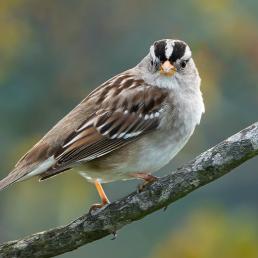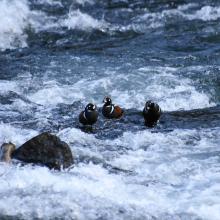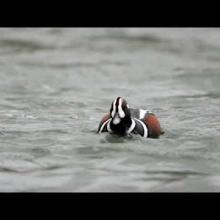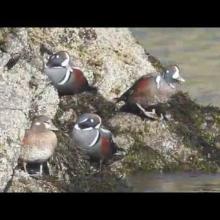

Join BirdNote tomorrow, November 30th!
Illustrator David Sibley and actor H. Jon Benjamin will face off in the bird illustration battle of the century during BirdNote's Year-end Celebration and Auction!
Some Harlequin Ducks migrate from the Pacific Coast all the way to the Teton Mountains in northwestern Wyoming to breed in the summer. White markings on both drakes and hens help them disappear amidst turbulent white water and rocks. Predators, like Peregrine Falcons, have a hard time spotting them. “Their whole strategy is secrecy,” explains retired Wyoming Game and Fish biologist, Susan Patla.
BirdNote®
Harlequin Ducks in the Tetons
By Tennessee Watson
It’s the end of August, and I’ve joined a handful of biologists in Grand Teton National Park in northwestern Wyoming, in search of the elusive Harlequin Duck.
Susan: It’s a tough species. One of the toughest.
Retired Wyoming Game and Fish biologist, Susan Patla, has spent close to 20 years protecting Wyoming’s Harlequin population and their summer breeding grounds in the Tetons. The ducks come from the Pacific Coast, and Wyoming is the farthest east this Harlequin population migrates.
The drakes are blue and rust colored, and the hens are golden-brown. Both have white markings that help them disappear amidst the turbulent white water and rocks.
Susan: Their whole strategy is secrecy.
Predators like Peregrine Falcons have a hard time seeing the Harlequins. And so do we. Grand Teton National Park biologist, Sarah Hegg, has already been out here for two days and counted only one brood — that is, a hen and her ducklings.
Sarah: There is a lot of just slow plodding . . . seeing ducks a very small percentage of the time.
Hegg is also out here to gather clues about the health of the habitat. She picks up a rock to see if there’s anything here for the ducks to eat.
Tennessee: What do you got?
Sarah: The outer shell of aquatic invertebrate.
Tiny aquatic creatures like this one fortify Harlequin ducklings for the long flight back to their winter homes — more than 800 miles away.
After a full day of slippery creek exploration, we admit defeat. Not one Harlequin sighting. That’s not necessarily a bad thing. For now, the Tetons still provide the secluded habitat the Harlequins need to thrive.
For BirdNote, I’m Tennessee Watson.
###
Producer: John Kessler
Production Manager: Allison Wilson
Editor: Ari Daniel
Producer: Mark Bramhill
Associate Producer: Ellen Blackstone
Field Recordings by Tennessee Watson
© 2020 BirdNote November 2020 Narrator: Tennessee Watson
ID# HARD-02-2020-11-22 HARD-02






